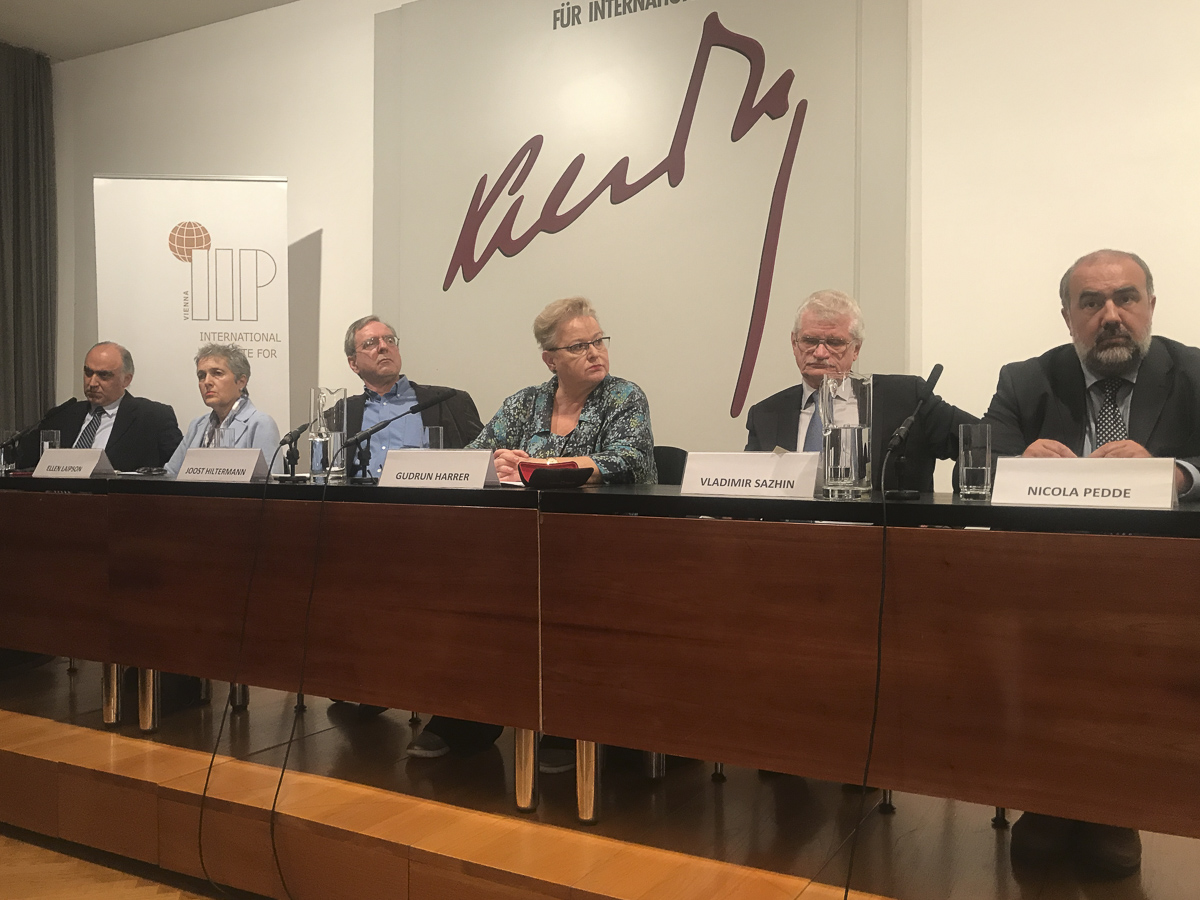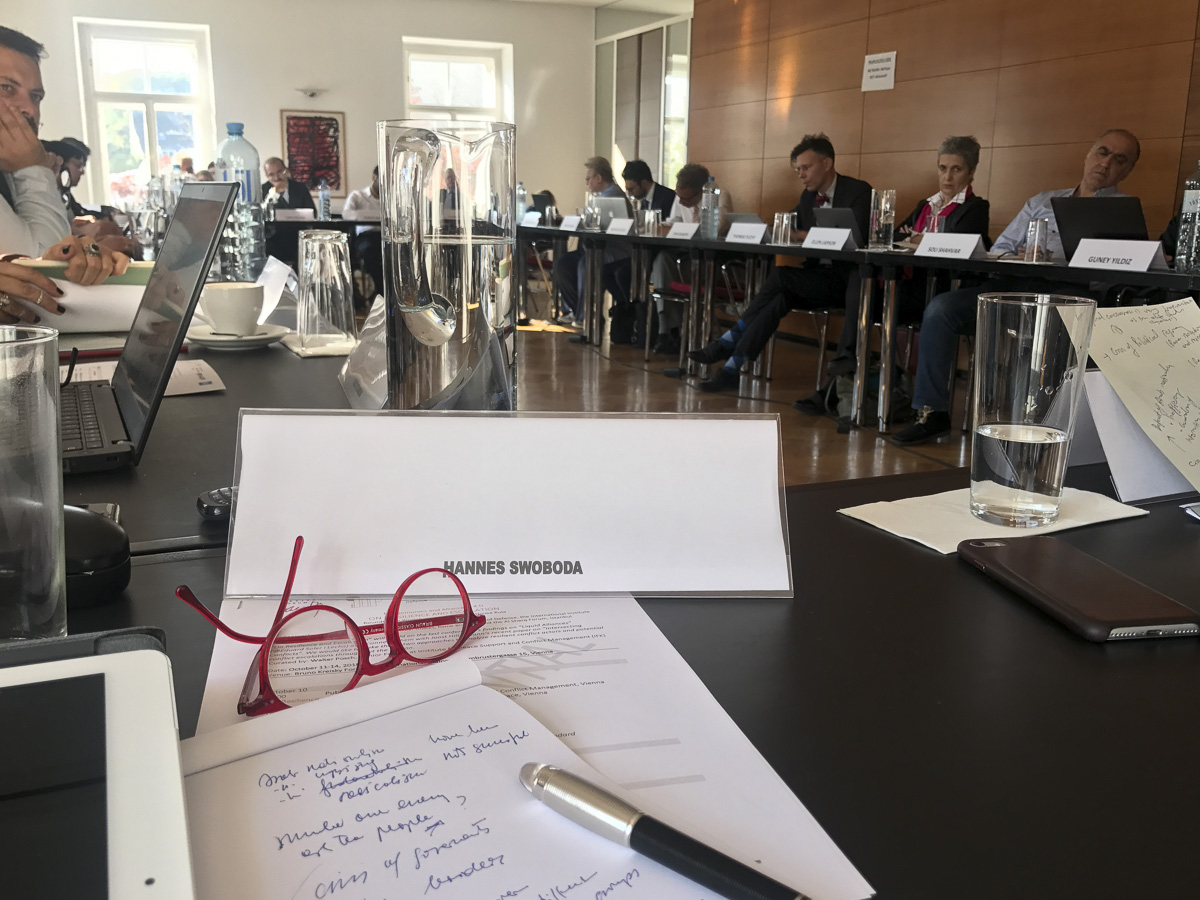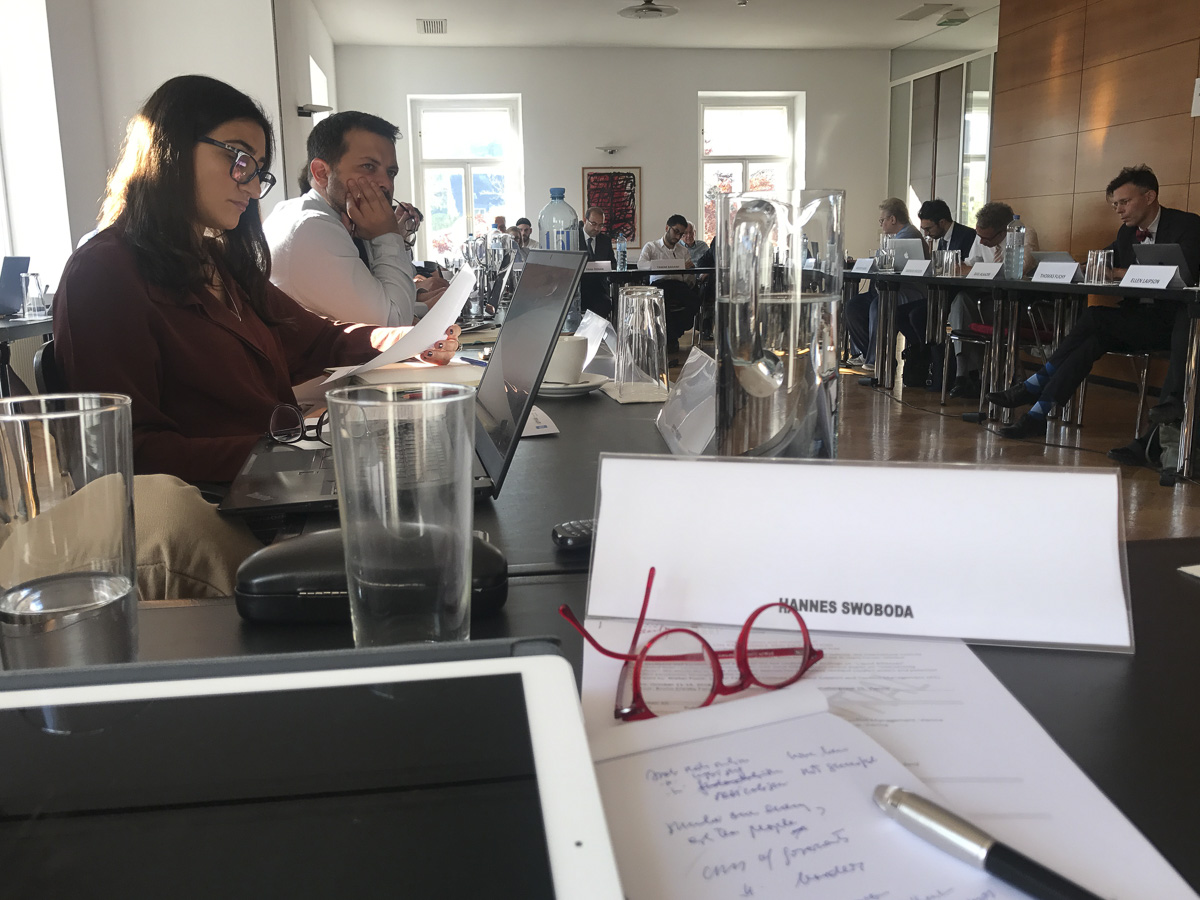TURBULENCES IN THE MIDDLE EAST ARE HERE TO STAY
On 10-14 October Kreisky Forum and the IIP with the support of the Austrian Ministry of Defence, the Institute for Global Studies, Rome-Brussels and the Al Sharq Forum, Istanbul, organized an expert workshop on Resilience and Escalation in the Middle East. We had three days of intensive round tables and a public event with a special focus to Syria.

A killing with consequences
The event was overshadowed by the death of the Saudi journalist and writer Jamal Khashoggi who was killed in the Saudi consulate in Istanbul. The workshop participants were already a few hours into their meetings when more detailed information on what had happened emerged. Saudi officials first denied that a murder had taken place at the consulate. Later, they came up with the „news“ that no serious person could believe. The death of Jamal Khashoggi was sad news for all the participants of the workshop to some of whom he was a good friend.
This killing, besides being a human tragedy, showed how complicated and contradictory the political life in all the countries of the Middle East still is. The simple story of the region told by many, including President Trump, is that Iran’s leadership are the bad guys and the Saudis and the Israelis are the good guys. Iran is supporting terrorism and extension of its power. Saudi Arabia is just selling oil and defends the people of the region against the Iranian aggressors and their proxies. And Israel is, of course, only a victim and never a perpetrator. Additionally, as it is primarily the victim of Iran aggression it is a hidden ally of Saudi Arabia.
Intersecting conflicts
But things are different from what President Trump and his special advisor for this region and son-in-law, Jared Kushner, want them to be. There are numerous conflicts and causes, as well as politicians responsible for the turmoil in the Middle East. One of our main discussants, Joost Hiltermann, has recently analyzed what he calls the „Intersecting Conflicts of the MENA Region“. Conflicts between the big powers from outside the region – USA and Russia, conflicts of competing powers in the region like Iran, Saudi Arabia and Turkey, the Israeli-Arab conflict, the Sunni radicalization and rise of terrorism and conflicts in the aftermath of the „Arab Spring“ are characterizing the region. Parallel to the political conflicts, the religious factors, especially the Sunni and Shia competition, are also having an impact. One could also add the conflicts concerning the different aspirations of the Kurds who live in Turkey, Iraq, Syria, and Iran. There are many knots connecting these different conflicts and it is very difficult to untangle them.
One factor which has been conducive to the new chaos in the Middle East is decline in American engagement and influence in the region in the last years. The current one-sided intervention of Trump administration is not helping to stabilize the region either. The American withdrawal connected with one-sided support for Israel and Saudi Arabia has had many consequences. It has given a free hand to Israel to continue its settlement policy and the nationalistic and ethnic interpretation of the Jewish character of Israel. It has given Saudi Arabia a free hand to fight a cruel war in Yemen. Finally, it has given Russia a possibility to come into the scene as the country who plays an important role in the future of Syria, as well as in relation to the security of Israel and Iran alike. It is the only power which can prevent a military clash between Israel and Iran and which can limit the Iranian presence in Syria, as the Israeli wish for a total withdrawal of Iran from Syria seems to be an illusion.
Unresolved conflicts
Europe – the EU – has never been strong enough to play a decisive role in the Middle East. It was very often bound to the US policy which was generally constrained by the Israeli resistance to tackle the Palestinian issue in a courageous way. This gave the Palestinian leadership the possibility to avoid courageous decisions from their side too. The Israeli-Palestinian conflict is still a core conflict in the Middle East, but it is by far not the only one. This gives Prime Minister Netanyahu an excuse to continue a policy of diminishing the chances of the two state solution for Israel and Palestine. Also, a common state or federation of two interconnected states is not on the agenda. We will have to live with this conflict for many years to come. This in turn means that the Palestinians will continue suffering under the Israeli occupation.
Another conflict which will stay unsolved and may again and again lead to wars is the Kurdish conflict. There is no willingness by any power inside or outside the region to allow for a common state for the Kurds. Also, autonomous regions are not well accepted by the „mother“ states. Because very often they are seen as first steps towards a struggle for independence. In addition to these conflicts and fights with the national governments there are conflicts amidst the Kurds themselves, especially the Kurdish groups who are influenced and even led by Abdullah Öcalan, and those Kurds who deny Öcalan’s common leadership of all the Kurds, as the majority of the Kurds in Iraq. Again, this is a conflict which will stay with us for a long time. Kurds may be used – as it has been lately done by the US and others – to fight ISIS or other extremist Arab/Islamic groups. Some already speak of misuse of the Kurds because the US will not honor all the visions and promises that were expressed when the Kurds were invited to fight ISIS.
The Syrian conflict, or rather conflicts
Concerning the hottest of the present conflicts, all experts were unanimous in their opinion that no precise forecast can be made, with the exception of the fact that no easy and quick solution will be found for Syria. Certainly, all the present actors will try to exercise influence also in the future. Russia, Iran and Turkey, as new and old regional powers, will continue to have a lot of influence. From within the country the Assad regime belongs to the winning side and will insist on the major role in the future Syria. ISIS has been beaten, but that does not mean automatically that it will not play any role in the future. The Kurds will also have their say in the future construction of Syria. Some think the new Syria will be some sort of a federation of regions with their outside promoters. And these neighbors will predominantly act in their own interest and not in the interest of their Syrian proxies and Syria as a whole.
For the Assad regime and its friends and followers it will be hard to agree to regionalization of Syria, as they would interpret it as dismantling of Syria and their power base. On the other hand, they could – and probably will – survive only due to the help of the outside friends, namely Iran and Russia. Of course, the regime will always hint to the Syrian army as the real winner. The power of the Assad regime depends very much on the defeat of ISIS. It seems that the dream of ISIS gaining a territory to establish the new Islamic state as a basis for a broader fight has been finished. But that does not mean that ISIS as such or its affiliate or substitute cannot have a new beginning, inside Syria or in any other region. Anyway, it will be difficult to govern a country when so many state and non-state actors are intervening into its politics and promoting their own interests. Any future „solution“ of the Syrian question may open new fields of conflicts.
Borders may remain but with a new meaning
Also, there are bigger regional interests at stake. Russia wants to maintain and strengthen its role in the Middle East. Turkey wants to prevent the strengthening of Kurdish, especially PKK/YPG, interests. Iran wants to build up a Shia/Iranian „crescent“ by creating a link from Iran to the Mediterranean Sea. It uses the war in Syria to establish such a link between the Shia and Iran oriented groups in Lebanon, Iraq, Syria and in Iran itself. So maybe, in the end, the borders of Syria will not change but the meaning of these borders will. Maybe the links across the outside/state borders to neighboring countries will sometimes be stronger than the links across internal borders to the national government.
One question is also the openness of borders for refugees. What will happen to them if they return to their former cities and regions.? Will they regain their property in spite of a law which could de facto deprive them of their property? Will they get a chance to open new businesses? Will their children get decent education? For the moment, the Assad regime does not show the necessary openness and welcoming attitude. And what about the readiness of the neighbors who are „controlling “ some regions to integrate returning refugees into „their“ regions? These questions are not only relevant for the refugees themselves and Syria, but also for Europe and especially the EU countries who received the majority of refugees.
Unity governments on the basis of ethnic divisions
When we speak about difficulties with governing a country, with regional powers using their proxies and allies within the country we should also look at the developments in Lebanon. The Taif Agreement from 1989 established the necessity to take into account all three major groups – the Sunni, the Shia and the Christians – when settling up the constitutional framework of the country: the president, the prime minister and the president of the Parliament. In the meantime, the Shia military group Hezbollah increased its power and public support. And that is expressed also by its strong civil position, for example in the last election.
The international community and especially the EU is demanding that the strong Shia share the power with other political groups to avoid new civil wars and to smoothen the position of Hezbollah. But such unity governments have the disadvantage of having no party in opposition left to control and scrutinize the government. A system of corruption and of sharing „benefits“ according to the size of parties is the consequence. And the electoral system in the country is enhancing the division of politics according to ethnic/religious criteria. Such a system could also be established in Syria with all these bad consequences coming along. We see it also in Europe, namely in Bosnia and Herzegovina. There are always national peculiarities, but generally if ethnical/religious divisions of countries are mirrored in politics, this has grave consequences for democracy and the rule of law.
Iran and Saudi Arabia
Whereas the Shia side inside the Middle East is rather united with a strong, although not uncontested, role of Iran, the Sunni side is very fragmented. Saudi Arabia and the United Arab Emirates play a big but also divisive role. They want stability and want to preserve their position and their power. That is contested especially by the Muslim Brothers and their affiliates. They are revolutionary in their character and want to fight an anti-colonial fight primarily against the US and their lackeys. The Emirates and Saudi Arabia fear their activities and ideology. This is also a difference to Iran. The Ayatollahs are also revolutionary and have a strong anti-US ideology and therefore, they have sympathies for the Muslim Brothers and also for Hamas even if they are Sunni.
In this respect, it would be wrong to exaggerate the religious differences between the Saudis and the Iranians. It is rather a question of political ideology, influence and power. And of course, Iran is like Israel (and Turkey): not an Arab power in an Arab region. Therefore, it needs to make a special effort to get sympathy and support by the Arab population. That makes understandable the strong fight between Saudi Arabia and its allies on the one side, and Iran and its allies on the other side.
Conclusion

Even if the war in Syria can be stopped soon, many conflicts will stay on the „agenda“ of the Middle East. It seems that there will be no change of external borders. However, Syria may join Lebanon as a country where external powers influence the domestic political development. In the case of Syria more external powers will be active. ISIS my be beaten for now, but may restructure itself and rise again. There is no visible solution for the Palestinian problem at the moment and the same is true for the Kurdish question. An open question is also the influence of Saudi Arabia and the Emirates in Syria.
The European Union has to consider what conditions it sets for financing the reconstruction of Syria. Without having a say in the future of that country and the return of refugees the EU should refrain from financing the reconstruction.

P.S. In the meantime also the Saudi authorities had to confess that Kashoggi has been murdered. And the killing has not been done by some private gang, but by officials of the Saudi Kingdom. Still the chain of command in this case is not yet clear. But it cannot be supposed that the overall mighty Crown Prince did not at least know about the well organized murder.
And that is reason enough for the Turkish President Erdogan to keep on putting the question: who is responsible for that murder and where is the body of the murdered. He takes with big satisfaction the chance of presenting himself as a staunch defender of human rights and of free journalism! This is also his chance to present himself as an honest leader of the Sunni community.
But Saudi Arabia has still many supporters – not only inside the Arab and Muslim world in general. Also the US will continue to support the Saudi Kingdom in its fight against the Iranians and the Muslim Brothers which have been defeated already in many ways. And at the Investors conference which took place immediately after the killing showed some investors declining to come but others ready to overlook the murder. And of course the Saudi Kingdom has still enough money to buy support. And we should not forget that Saudi Arabia is globally the biggest arms importer and therefore an arms embargo will not be realized.
One commentator in Le Monde has expressed the view, that with the murder of Kashoggi the last representative of the Arab – spring – revolution has been killed. At least that part of the Arab spring which wanted to open Arab political structures also for Muslim Brothers as a step towards more democratic systems. Unfortunately the Muslim Brothers in Egypt did not use their power after the fee elections in a wise and convincing way. And President Erdogan as a friend and supporter of the Muslim Brothers is also not the best ally to have from a democratic point of view.
At the end the murder of Kashoggi was another symbol of a Middle East which is not going towards peace, democracy and openness. Chaos will be here to stay.
